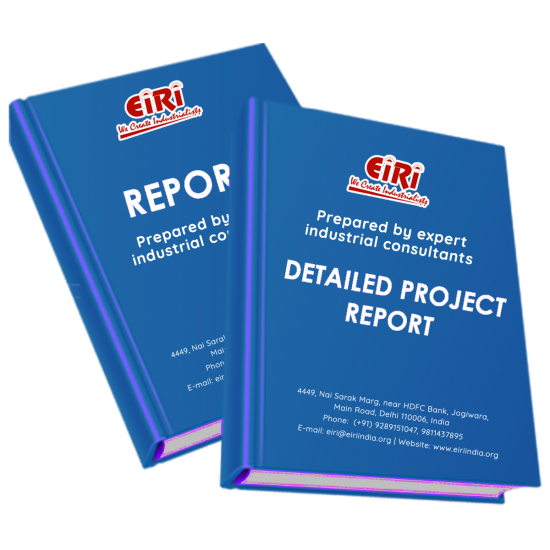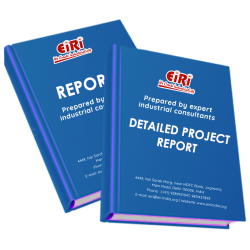Detailed Project Report on Epoxidized Soyabean Oil (Secondary Plasticizer) Used in PVC Compound

- More than 40 years of experience
- Managed by expert industrial consultants
- ISO 9001-2015 Certified
- Registered under MSME, UAM No: DL01E0012000
- 24/5 Research Support
Get your quesries resolved from an industry expert. Ask your queries before report or book purchase. - Custom Research Service
Speak to the our consultant to design an exclusive study to serve your research needs. - Quality Assurance
All reports are prepared by highly qualified consultants & verified by a panel of experts. - Information Security
Your personal & confidential information is safe & secure.
EPOXIDIZED SOYABEAN OIL (SECONDARY PLASTICIZER) USED IN PVC COMPOUND
[EIRI/EDPR/1500] J.C. 286
INTRODUCTION
Epoxidized soybean oil, better known by its acronym, ESBO, is a plasticizer used in polyvinyl chloride (PVC) plastics. It serves as a plasticizer and as a scavenger for hydrochloric acid liberated from PVC when the PVC undergoes heat treatment.
A few EU surveys have shown fairly high levels of ESBO in foods, in which about 4% were above the current specific migration limit (SML) for ESBO of 60 mg/kg and about 15% of the samples were above 30 mg ESBO/kg food. High migration levels might lead to an intake that exceeds the existing Tolerable Daily Intake of 1 mg/kg body weight/day.
Epoxidized linolein a major component of ESBO
ESBO is manufactured from soybean oil through the process of epoxidation. The reason why vegetable oils are widely used as plasticizers is because the high numbers of carbon-carbon double bonds present in vegetable oils make them a good target for manipulation into some other useful products like in this case - from soybean oil into epoxidized soybean oil. The epoxide group is more reactive than double bond, thus providing a more energetically favorable site for reaction and making the oil a good hydrochloric acid scavenger and plasticizer. Usually a peroxide or a peracid is used to add an atom of oxygen and convert the -C=C- bond to an epoxide group.
Metal closures incorporate a ring-shaped gasket formed from a bead of liquid plastisol containing up to 40% ESBO which is moulded into the correct profile in the closure shell using a hot punch, then fused by passing through an oven at 200°C for 90 seconds. PVC starts to break down at this high temperature and releases hydrogen chloride. ESBO functions as a stabilizer to scavenge this hydrogen chloride to prevent the autocatalytic breakdown of the polymer. It also functions as a plasticizer.
Vegetable oil finds sustainable and renewable source of raw material. The unsaturation present in vegetable oils can be chemically modified to a value added product by a complicated reaction called ‘epoxidation’. Due to the high reactivity of the oxirane ring epoxides can also act as a raw material for synthesis of variety of chemicals such as alcohols (polyols), glycols, olefinic compounds, lubricants, plasticizer and stabilizer for polymers and their demand is increasing day by day. Vegetable oil represents one of the cheapest and most abundant biological feedstock available in large quantities and its use as starting material offers numerous advantages such as low toxicity and inherent biodegradability. Thus the economic value of the vegetable oil could be increased by converting the vegetable oil into epoxidized vegetable oil. The double bonds in the vegetable oil are used as reactive sites in the coatings and they can also be functionalized by epoxidation. Thus the high molecular weight products can be obtained by increasing the cross linking. Now due to the increasing levels of awareness regarding environment is driving the development of sustainable green materials.
Petrochemical based resin such as epoxy, polyester and vinyl ester find more engineering application because of their advantageous material properties such as high stiffness and strength. However these resins have serious drawbacks in terms of biodegradability, initial processing cost, energy consumption and health hazards. Consequently there is a requirement to develop novel biobased product from renewable feedstock. Therefore a number of researchers have been studied vegetable oils as alternative feedstock to substitute for petroleum. Hence it needs to be explored for the various applications in chemical industry.
The double bonds in the vegetable oils are used as reactive sites in coatings and they can also be functionalized by epoxidation. The utilization of epoxidized vegetable oil has become more common in the past few years. Moreover, plasticizers and additives for polymer PVC derived from vegetable oil based have been shown to have improved performance in terms of high resistance to heat and light.
COST ESTIMATION
Plant Capacity 3.00 MT/Day
Land & Building (1500 Sq.Mtr) Rs 2.11 Cr
Plant & Machinery Rs.41.00 Lacs
W.C. for 3 Months Rs. 1.70 Cr
Total Capital Investment Rs. 4.34 Cr
Rate of Return 22%
Break Even Point 58%
How to Make Project Report?
Detailed Project Report (DPR) includes Present Market Position and Expected Future Demand, Technology, Manufacturing Process, Investment Opportunity, Plant Economics and Project Financials. comprehensive analysis from industry covering detailed reporting and evaluates the position of the industry by providing insights to the SWOT analysis of the industry.
Each report include Plant Capacity, requirement of Land & Building, Plant & Machinery, Flow Sheet Diagram, Raw Materials detail with suppliers list, Total Capital Investment along with detailed calculation on Rate of Return, Break-Even Analysis and Profitability Analysis. The report also provides a birds eye view of the global industry with details on projected market size and then progresses to evaluate the industry in detail.
We can prepare detailed project report on any industry as per your requirement.
We can also modify the project capacity and project cost as per your requirement. If you are planning to start a business, contact us today.
Detailed Project Report (DPR) gives you access to decisive data such as:
- Market growth drivers
- Factors limiting market growth
- Current market trends
- Market structure
- Key highlights
Overview of key market forces propelling and restraining market growth:
- Up-to-date analyses of market trends and technological improvements
- Pin-point analyses of market competition dynamics to offer you a competitive edge major competitors
- An array of graphics, BEP analysis of major industry segments
- Detailed analyses of industry trends
- A well-defined technological growth with an impact-analysis
- A clear understanding of the competitive landscape and key product segments
Need Customized Project Report?
- Ask for FREE project related details with our consultant/industry expert.
- Share your specific research requirements for customized project report.
- Request for due diligence and consumer centric studies.
- Still haven't found what you're looking for? Speak to our Custom Research Team
About Engineers India Research Institute:
Note: We can also prepare project report on any subject based on your requirement and country. If you need, we can modify the project capacity and project cost based on your requirement.
Our Clients

Our Approach
- Our research reports comprehensively cover Indian markets (can be modified as per your country), present investigation, standpoint and gauge for a time of five years*.
- The market conjectures are produced on the premise of optional research and are cross-accepted through associations with the business players
- We use dependable wellsprings of data and databases. What's more, data from such sources is handled by us and incorporated into the report
Why buy EIRI reports?
- Our project reports include detailed analysis that help to get industry Present Market Position and Expected Future Demand.
- Offer real analysis driving variables for the business and most recent business sector patterns in the business
- This report comprehends the present status of the business by clarifying a complete SWOT examination and investigation of the interest supply circumstance
- Report gives investigation and top to bottom money related correlation of real players/competitors
- The report gives gauges of key parameters which foresees the business execution





















